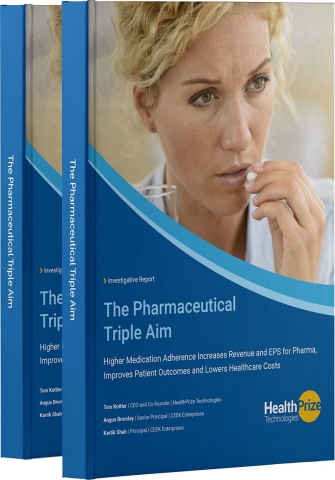NORWALK, Conn.--(BUSINESS WIRE)--With a business responsibility to increase revenue for shareholders, pharmaceutical companies continue to deploy the age-old strategy of raising prices, an approach responsible for 100 percent of earnings-per-share (EPS) growth in 20161. A new report conducted by HealthPrize Technologies and CEEK Enterprises shows pharmaceutical companies are missing out on a larger revenue opportunity—one that can boost revenue and EPS by improving medication adherence. Unlike price hikes, addressing adherence also improves patient outcomes and lowers overall healthcare costs—the pharmaceutical triple aim.
“According to research conducted by Capgemini Consulting, every year, pharmaceutical companies lose $637 billion in revenue due to medication non-adherence—or patients not taking their medications as prescribed,” said Tom Kottler, CEO and Co-founder, HealthPrize. “This new report, along with an analysis conducted by Credit Suisse last year, calculates the positive impact improved medication adherence can have on revenue and EPS for 21 of the world’s largest pharmaceutical companies.”
In Fall 2018, HealthPrize Technologies and CEEK Enterprises partnered to extend the Credit Suisse analysis, which found that increased adherence at the enterprise level, based on relatively conservative assumptions, could substantially increase revenue and EPS every year from 2020–2026 for seven large-cap pharmaceutical companies: Merck, Pfizer, Bristol Myers Squibb, Johnson & Johnson, Lilly, Allergan, and AbbVie.
The new report used a similar methodology to analyze an additional 14 pharmaceutical companies, including Amgen, Astellas, AstraZeneca, Bayer, Biogen, Celgene, Gilead, GSK, Novartis, Novo Nordisk, Roche, Sanofi, Shire, and Takeda. Consistent with the Credit Suisse findings, the report found that a nominal increase in medication adherence can positively impact revenue and EPS for each of the companies analyzed.
Sanofi, for example, is predicted to experience up to 12 percent greater revenue and 20 percent higher EPS with higher adherence. Novo Nordisk, a company that offers diabetes drugs, which are well-known to have a low adherence rate, is predicted to experience up to 29 percent greater revenue and 45 percent higher EPS with higher adherence.
“There’s a much better solution than price hikes staring pharma in the face that will benefit their shareholders, the healthcare system and patient outcomes,” said Kottler. “Taking a strategic, enterprise approach to adherence can give pharmaceutical companies an immediate opportunity to achieve their industry’s triple aim – increasing revenue and EPS, improving patient outcomes and reducing the overall cost of health care.”
Data showing revenue and EPS increases for all 21 pharmaceutical companies analyzed are included in the new report. Download it here: https://healthprize.com/pharmaceutical-triple-aim/
About HealthPrize Technologies
HealthPrize, the leading cloud-based patient experience and adherence platform for life science companies, uses gamification, behavioral economics and loyalty marketing to deliver mean adherence lifts of 52% across all drugs, diseases, demographics and dosages. Learn more at HealthPrize.com or follow @HealthPrize on Twitter.
About CEEK Enterprises
CEEK is a specialized management consultancy focused on the biopharma and medical technology industries. With clients ranging from “Top 5” biopharma companies to start-up organizations seeking financing, our breadth and depth of expertise allows CEEK to help clients address critical corporate / commercial / clinical issues and drive value creation.
1 Vamil Diwan, Michael Morabito and Barbara Kotei. “What if Patients Actually Took their Drugs? Assessing an Underappreciated Opportunity,” Credit Suisse, March 15, 2018.

